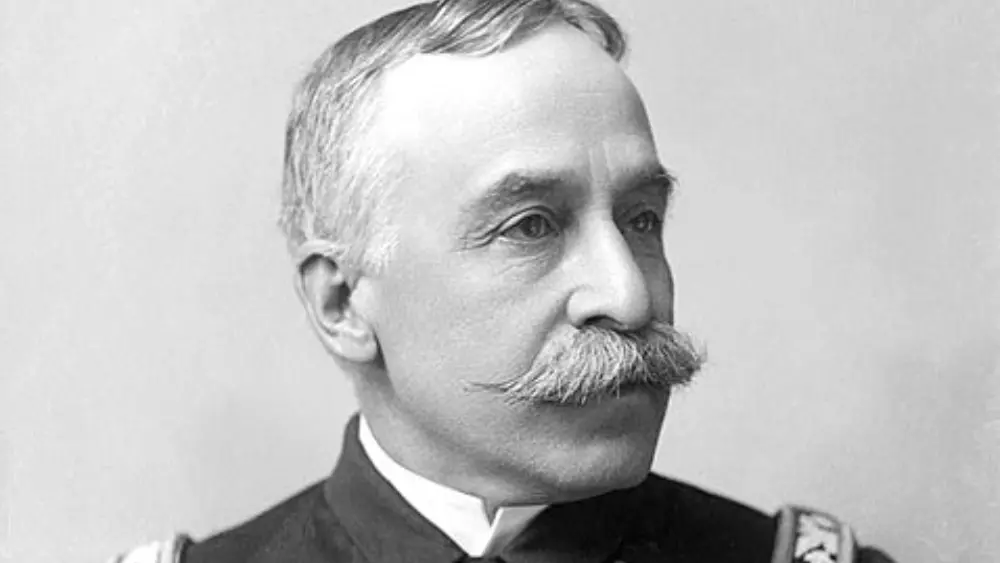George Dewey, born on December 26, 1837, in Montpelier, Vermont, etched his name into history as a naval hero, particularly for his decisive victory at the Battle of Manila Bay during the Spanish-American War. Admiral Dewey’s strategic brilliance and leadership in this pivotal naval engagement elevated him to the status of a national hero.
Early Life and Naval Career
George Dewey’s early life was characterized by a deep commitment to a life of service, setting the stage for a distinguished naval career. At the young age of 15, he entered the United States Naval Academy, showcasing an early dedication to honing his skills and knowledge in maritime affairs. Dewey’s formative years at the academy laid the groundwork for the leadership qualities and strategic acumen that would define his naval career.
As Dewey progressed through his naval career, he demonstrated exceptional leadership in various roles. His commitment to service and his ability to navigate complex naval operations propelled him through the ranks. Dewey’s early experiences in the Naval Academy and subsequent naval service became the crucible in which he developed the skills and attributes that would ultimately lead him to significant accomplishments and recognition in the U.S. Navy.
George Dewey: The Battle of Manila Bay
George Dewey’s moment of glory occurred on May 1, 1898, during the Spanish-American War, at the Battle of Manila Bay. Leading his Asiatic Squadron, Dewey confronted the Spanish Pacific Squadron in a remarkable display of naval power and tactical brilliance. The battle fought in the waters of the Philippines proved to be a turning point in the conflict. Dewey’s fleet executed a decisive victory, showcasing the effectiveness of American naval forces and establishing Dewey as a national hero.
The Battle of Manila Bay not only solidified Dewey’s place in history but also had broader implications for the outcome of the Spanish-American War. Dewey’s strategic acumen and the success of his naval forces in the Pacific played a pivotal role in the United States’ ability to assert its naval dominance and ultimately contribute to the overall victory in the war. The triumph at Manila Bay elevated George Dewey to the status of a celebrated military leader and a symbol of American naval prowess.
Strategic Brilliance and Innovation
George Dewey’s success at the Battle of Manila Bay was attributed to his strategic brilliance and innovative thinking. Recognizing the importance of surprise in naval warfare, Dewey orchestrated a well-coordinated attack that took advantage of the element of surprise. His understanding of naval tactics and the geography of the bay allowed him to outmaneuver the Spanish fleet, positioning his forces for maximum effectiveness.
In addition to his strategic acumen, Dewey showcased innovation in naval warfare. His use of modern technology, particularly the long-range capabilities of the American ships, played a crucial role in the victory. By leveraging the advanced firepower and maneuverability of his fleet, Dewey demonstrated a forward-thinking approach to naval warfare. The success at Manila Bay highlighted not only Dewey’s mastery of traditional naval tactics but also his ability to incorporate technological advancements and strategic innovation into the execution of decisive military actions.
George Dewey: National Hero and Promotion
George Dewey’s victory at the Battle of Manila Bay catapulted him to the status of an instant national hero. News of the triumph spread rapidly, and the phrase “Dewey Defeats Spanish Fleet” became a headline that resonated across the United States, capturing the imagination of the American public. Dewey’s success not only symbolized American naval prowess but also contributed to the overall fervor and optimism surrounding the Spanish-American War.
In recognition of his historic achievement, Dewey received a promotion that underscored the magnitude of his victory. He was elevated to the rank of Admiral of the Navy, a position created specifically for him. This promotion made Dewey the highest-ranking officer in the history of the United States Navy, cementing his place in the annals of American military history. The unique rank of Admiral of the Navy reflected the exceptional nature of Dewey’s accomplishments and the esteem in which he was held by the nation.
Post-War Contributions and Diplomacy
After the Spanish-American War, George Dewey’s contributions extended beyond his military achievements as he actively engaged in diplomatic efforts. Notably, he played a key role in the negotiations for the Treaty of Paris, which marked the official end of the conflict. Dewey’s diplomatic acumen proved to be a valuable asset, contributing to the formulation of terms that favored the United States. His involvement in diplomatic affairs showcased a multifaceted leadership that went beyond the battlefield, demonstrating an ability to navigate complex negotiations and contribute to shaping the post-war landscape.
Dewey’s post-war diplomatic contributions solidified his reputation as a statesman and strategist. His role in the Treaty of Paris negotiations highlighted the seamless transition from military commander to diplomatic representative. This transition underscored Dewey’s versatility and the breadth of his impact on U.S. foreign relations during a crucial period in the nation’s history. Furthermore, it showcased his ability to navigate complex diplomatic waters with the same skill and precision that defined his military leadership.

George Dewey: Legacy and Honors
Admiral George Dewey’s legacy stands as an enduring chapter in American naval history, cementing his place among the distinguished naval commanders of the nation. His pivotal leadership during the Battle of Manila Bay in the Spanish-American War demonstrated strategic brilliance and decisiveness, leaving a lasting impact on the future of the United States Navy. Dewey’s resounding victory not only elevated him to the status of a national hero but also contributed significantly to the broader narrative of American military prowess. Furthermore, his triumph underscored the nation’s growing influence on the global stage.
The accolades granted to Admiral Dewey serve as a manifestation of the nation’s appreciation and acknowledgment of his remarkable service. Medals, statues, and the christening of ships together signify the lasting influence of his leadership and triumph. These tributes not only commemorate Dewey’s historic achievements but also symbolize the profound respect and admiration he commands within the annals of American naval history. Moreover, they serve as enduring reminders of his enduring legacy and contributions to the nation’s maritime heritage. Celebrating his legacy through these honors, Admiral Dewey’s contributions remain an integral part of the maritime heritage and serve as an inspiration for future generations of naval leaders.










